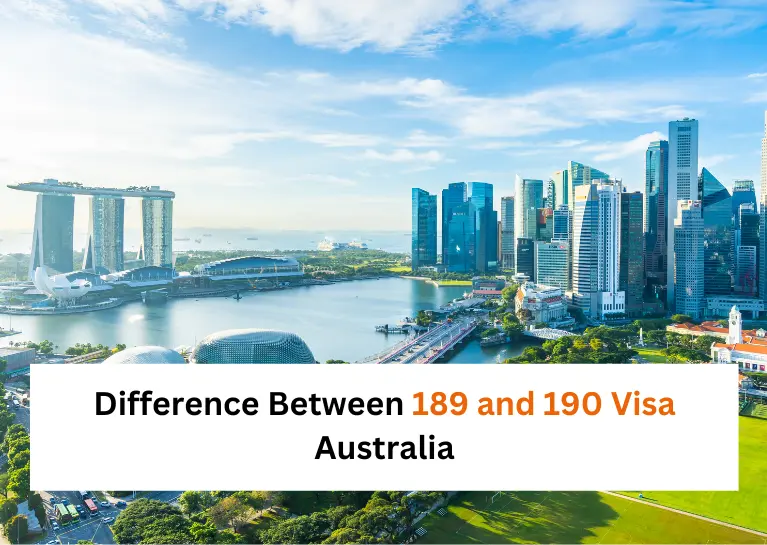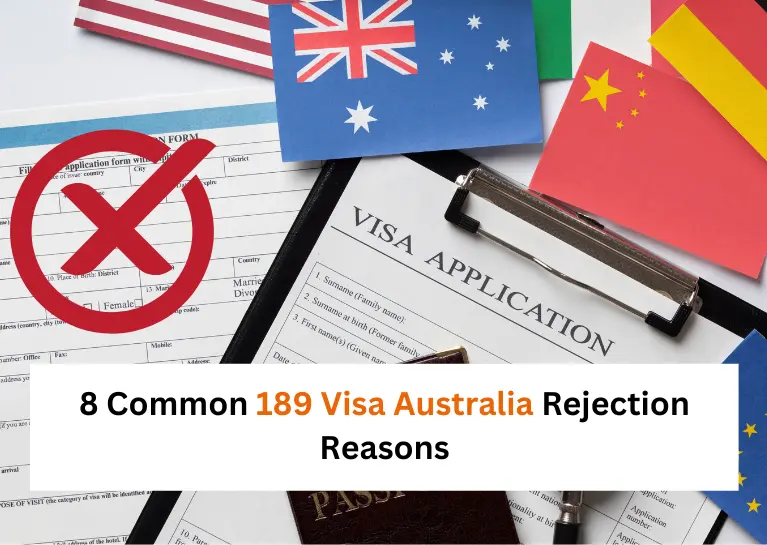To experienced foreigners looking forward to starting a new life in the active community in Australia, the country’s Visa system may appear intricate. There are two main approaches to obtaining a permanent residence: Skilled Independent Visa (Subclass 189) and Skilled Nominated Visa (Subclass 190). Crucial for the selection of an option that best suits your desires and needs is understanding the difference between 189 and 190 visa. With this comprehensive guide, you will be able to move around confidently during your immigration process to Australia with these two classes of visas.
Table of Contents
ToggleWhat is a 190 Visa?
The Skilled Nominated Visa (Subclass 190) is a permanent residency visa designed specifically for migrants with skills whom an Australian state or territory government has nominated. These states actively seek individuals who have the skills required for their particular economic needs.
Let’s say that you are a qualified software engineer. One of the states might nominate you for visa 190 because it is experiencing shortages in tech talent. This nomination greatly increases the possibility of you receiving an invitation to apply for permanent residency in Australia.
Benefits 190 visa
- Benefits:
- Increased chance of receiving an invitation to apply
- Tailored to specific state needs, potentially leading to better job opportunities
- Pathway to Permanent Residency
Drawbacks 190 visa
- Requires nomination from a state/territory, limiting geographic flexibility
- May have stricter eligibility requirements compared to the 189 visa (depending on the state)
What is an 189 Visa?
The Skilled Independent Visa (Subclass 189) is a permanent residency visa for skilled migrants who do not require a state or territory nomination. This visa pathway underscores your individual aptitudes and qualifications within the Australian context.
Imagine yourself as a highly experienced accountant with a solid reputation. Your proficiency and background might be adequate to secure an independent visa invitation even if you don’t have a particular state nomination.
Benefits of 189 visa
- Greater geographic flexibility – you can live and work anywhere in Australia
- Potentially faster processing times compared to some state-nominated 190 visa
- No requirement for a job offer before applying
Drawbacks of 189 visa
- Receiving an invitation to apply can be more competitive
- It may require a higher score on the points test compared to some state-nominated 190 visa
What’s the Difference Between 189 and 190 Visa?
Now, let’s delve deeper into the difference between 189 and 190 visa across various key aspects:
Visa Type:
- 190 Visa: Skilled Nominated Visa (Subclass 190)
- 189 Visa: Skilled Independent Visa (Subclass 189)
State/Territory Nomination:
- 190 Visa: Requires a nomination from a specific Australian state or territory government.
- 189 Visa: Does not require a nomination from a state or territory.
Points Test:
- 190 Visa: You generally need at least 65 points to apply for a 190 visa. Some states may provide additional points (usually 5 to 10) for applying for a 190 visa based on their specific requirements.
- 189 Visa: Minimum points required for applying for an 189 visa are often higher, mostly around 70 – 75.
Occupation Lists:
- Skilled Occupations for 190 Visa:
| Occupation Name | Occupation Code |
|---|---|
| Accountant | 221111 |
| Software Engineer | 261313 |
| Registered Nurse (Aged Care) | 254412 |
| Civil Engineer | 233211 |
| Marketing Specialist | 225113 |
- Skilled Occupations for 189 Visa:
| Occupation Name | Occupation Code |
|---|---|
| ICT Business Analyst | 261111 |
| Registered Nurse (Medical Practice) | 254421 |
| Electrical Engineer | 233311 |
| Social Worker | 272511 |
| Architect | 232111 |
English Language:
- Both 190 and 189 Visas: Require applicants to demonstrate a proficient level of English language skills through an approved English language test.
Residency Obligations:
- 190 Visa: Residency requirements may include residing and working in the nominating state for a period of time.
- 189 Visa: There is no obligation to reside in any particular state or territory under this visa.
Application Process
- 190 Visa: Involves two stages- first, indicating interest in the nomination program for a particular state; then, if nominated, applying for the visa itself.
- 189 Visa: One-stage application process straight to the Department of Home Affairs.
The application process for both visas involves several key steps:
Eligibility Criteria:
- Age: Generally, applicants must be under 45 years old (exceptions may apply).
- Skills assessment: Obtain a positive skills assessment from a designated assessing authority for your nominated occupation.
- Points test: Achieve a minimum score on the Australian points test, which assesses factors like age, education, work experience, and English language skills. You can find your points through an Australian immigration points calculator.
- Health requirements: Undergo health examinations to ensure you meet Australia’s health standards.
- Character requirements: Pass a character check.
Permanent residency status
Both the 189 and 190 visas offer a pathway to permanent residency in Australia. This means you’ll be able to live, work, and study in Australia indefinitely, with the ability to sponsor eligible family members for permanent residency later.
Job Requirements:
- 190 Visa: While a job offer is not mandatory, some states may give preference to applicants with confirmed employment in their nominated occupation.
- 189 Visa: A job offer is not required for application, but demonstrating strong employability can strengthen your application.
Processing Times:
Processing times can vary depending on individual circumstances and workload, but as a general guide:
- 190 Visa: Processing times can range from several months to a year, depending on the nominating state.
- 189 Visa: Processing times can also range from several months to a year, but may be slightly faster compared to some state-nominated 190 visa.
Which visa is better, Subclass 189 or Subclass 190?
There is not one single visa that is “better” – the best decision for you depends on your situation and what is most important to you. Please take into account these things:
- Places of job: In case you want to live in a specific state because of work may prefer a 190 visa over anything else while those who are looking for job opportunities throughout Australia should consider an 189 visa instead.
- Occupations: Check out which occupation list matches with your profession under MLTSSL for 189 visa; Also find out more about other state nomination programs available by researching them too so as not to miss anything that may fit better or more accurately.
- Points test score: If your point score might be lower than expected, then there is a chance that some state-nominated 190 visa would provide an easier pathway for you.
Helpful for you: Best Australian Immigration Consultant Pakistan.
Do I need to have a job offer to apply for a Subclass 189 or Subclass 190 visa?
No, a job offer is not required for an 189 or 190 visa application. However, having hands-on experience, skills, and qualifications can enhance your application for either visa to a great extent. Moreover, certain states may favor candidates with positive employment status in their chosen occupation when nominating for 190 visa.
Conclusion
Understanding the difference between 189 and 190 visa will enable a person to decide wisely about his or her Australian immigration. These both are good chances for skilled migrants to establish a fulfilling life in Down Under. Assess your situation, abilities, and career goals very well for you to select a visa that will help you succeed uniquely in Australia.






